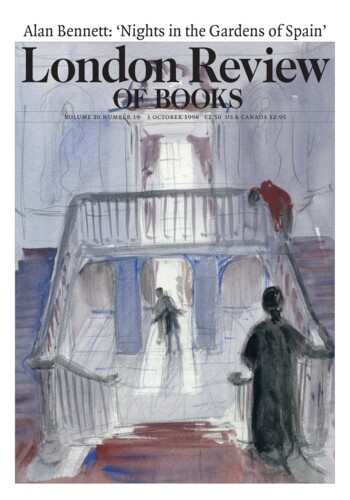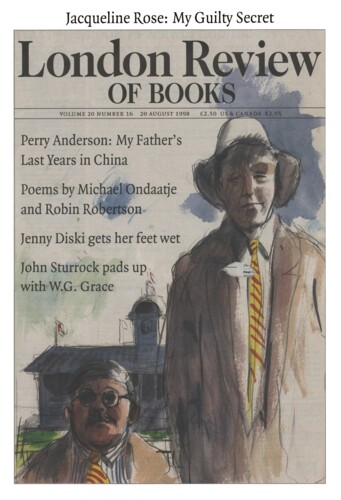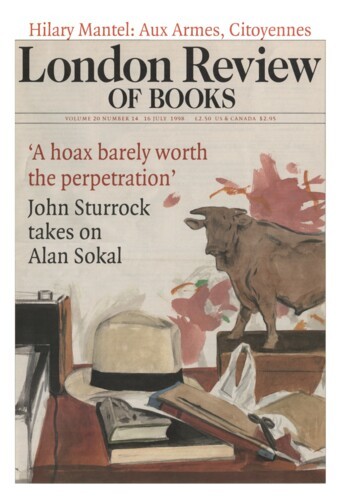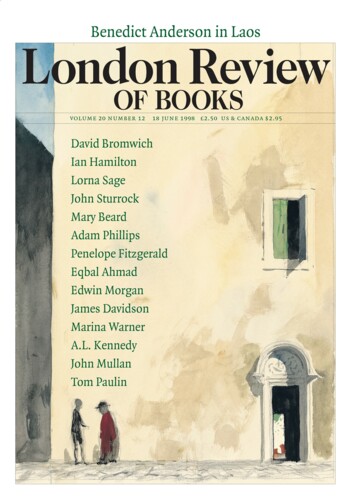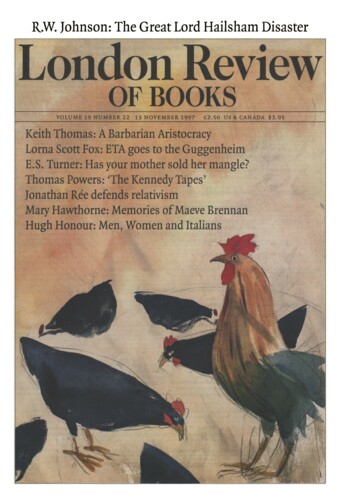John Sturrock
John Sturrock was the LRB’s consulting editor from 1993 until his death in August 2017. He had been the deputy editor of the TLS for many years before that. He translated Stendhal, Victor Hugo, Georges Perec and Proust, among others; and wrote books on Borges, structuralism, autobiography and the Pyrenees. The View from Paris, a collection of essays on postwar French intellectuals, was published in 1998. Many of those essays first appeared in the LRB, along with occasional pieces on cricket.
The Great Accumulator: W.G. Grace
John Sturrock, 20 August 1998
As English cricket’s first, and permanent, icon, W.G. Grace was a pair of inseparable initials – two doors down from that other High Victorian celebrity, ‘W.E.’ – and a ruling presence on the field of play, the muscular and assertive embodiment of the game in the years of its benign colonisation of the nation’s summers. The physique that famously sustained him was in truth a luxury: Grace was stronger than there was any call for a cricketer to be, ready to go off when young to run hurdle races between innings, and still up to bowling 75 overs in the match at the age of 50 (he was captain, and didn’t think of taking himself off). To which enviable share of vitality he added a mastery of cricket’s as yet unfinished techniques such that he did the most of anyone to bring the English game out from obscurity in the Shires and into the profit and the coverage that follow from playing in the middle of town.’‘
Le pauvre Sokal: the Social Text Hoax
John Sturrock, 16 July 1998
Way back in the pre-theoretical Fifties, a journalist called Ivor Brown used to have elementary fun at the expense of a serial intruder on our insular peace of mind, a bacillus known as the LFF, or Latest Foreign Fraud. By this he meant any thinker from abroad (Paris, nine times out of ten) whose alembicated ideas were being taken up with more excitement than he thought they – or, I daresay, any ideas – were worth. Brown’s catchpenny campaign in defence of our mental virginity was brought fleetingly back to memory by the title of Intellectual Impostures, a similarly prophylactic exercise which has it in for the French thinkers who have come among us since the late Sixties, bearing what Alan Sokal and Jean Bricmont would like to see ostracised as fatuous, if not actually nonsensical ideas.’
Lights by the Ton: Jean Echenoz
John Sturrock, 18 June 1998
The weightless characters who track about in Jean Echenoz’s novels are granted a sense now and again that that’s where they are, in someone else’s story, fulfilling burlesque routines not of their own devising. They’re not great thinkers, merely see-through functionaries of the plot. There’s a droll exchange marking one of these twinges of self-awareness in an early novel called Cherokee – named for the Forties song, not for the Native Americans as such – between the driver of a Deux-Chevaux and his captive passenger: ‘ “We could take you somewhere.” “That’s it,” said Georges, “take me somewhere.” ’ Which is what they do, and what Jean Echenoz with obvious pleasure does to us, taking us on what feels like a random tour, as guests of a narrative itself showing enough wear to count as the equivalent in print of a dented Citroën. For such are the cheerfully vagrant and pastiche plots of this by now experienced farceur, who keeps Georges – a man whose congenital blindness in respect of his future extends to falling asleep while having his fortune told – and his obliging backseat kind hurrying in this direction and that, while denying them the inner life any intrusion on the mechanics of which would not only hold things up but undermine the novels’ serene superficiality.’‘
Monsieur Apollo
John Sturrock, 13 November 1997
The 22-year-old Flaubert, as yet only a bored law student in Paris, writing to his sister in Rouen to tell her of the evening he had spent with, among others, Victor Hugo:
Pieces about John Sturrock in the LRB
The Thing: Versions of Proust
Michael Wood, 6 January 2005
What was it Proust said about paradise? That all paradises are lost paradises? That the only true paradise is a lost paradise? That it isn’t paradise until it’s lost? That paradise is...
Roger Poole on the seductions and dangers of structuralism
Roger Poole, 5 June 1980
John Sturrock’s little book is the best single guide to its subject that has yet appeared. Structuralism and Since demands, though, that its title be taken literally. It traces, technically...
Read anywhere with the London Review of Books app, available now from the App Store for Apple devices, Google Play for Android devices and Amazon for your Kindle Fire.
Sign up to our newsletter
For highlights from the latest issue, our archive and the blog, as well as news, events and exclusive promotions.
